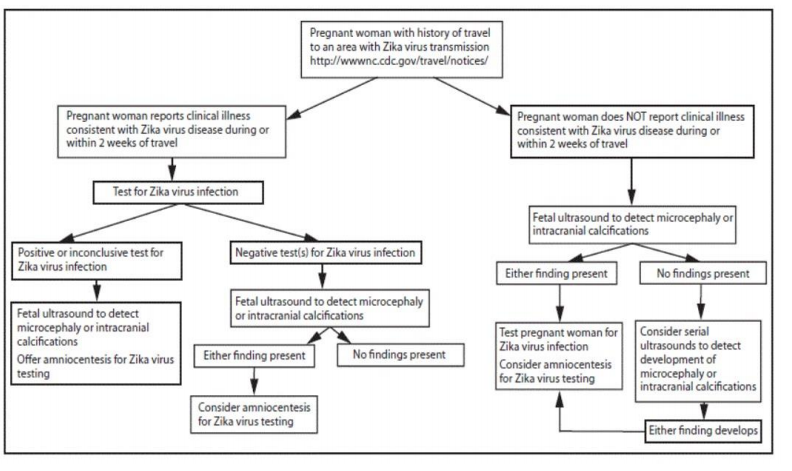Health Advisory – Zika Virus in Travelers and Pregnant Women
| Date: | 1 February 2016 |
| to: | Health Care Providers |
| Subject: | Health Advisory – Zika Virus in Travelers and Pregnant Women |
| From: | Julie Vaishampayan, MD, MPH, Assistant Health Officer Alvaro Garza, MD, MPH, Health Officer |
Background Zika virus is transmitted by the bite of infected Aedes aegypti and Aedes albopictus mosquitoes, which are aggressive day biters (also the vectors of: Dengue, Chikungunya, and Yellow Fever viruses). In May 2015, Zika virus started circulating in the Western Hemisphere. The first locally-acquired case in the Americas was reported in Brazil. Since that time, local transmission of the virus has been reported in Mexico, the Caribbean, Central America, and South America. An updated list of affected countries can be found at http://www.cdc.gov/Zika/geo/index.html
Situation Zika virus outbreaks are occurring in many countries in the Americas. On January 15, 2016, the Centers for Disease Control and Prevention (CDC) began issuing travel advisories (http://wwwnc.cdc.gov/travel/notices) for people, particularly pregnant women, traveling to places where ongoing Zika virus transmission has been documented. There have been reports in Brazil of increased numbers of newborns with microcephaly and fetal losses among mothers who were infected with Zika virus while pregnant. Zika virus infection may pose a risk to women who visit endemic areas during pregnancy.
To date, NO local transmission has been documented in the United States; however, case-patients with Zika virus have been reported in travelers returning back to the United States. Public Health can facilitate diagnostic testing (since testing is unavailable commercially). Public Health also works with partners to mitigate the risk of local transmission. The mosquito vectors have not been identified in San Joaquin County at this time but surveillance is on-going.
Actions Requester of Clinicians
Suspect Zika in a patient with acute onset of fever, maculopapular rash, arthralgia or conjunctivitis, who traveled to areas with ongoing transmission in the two weeks prior to illness onset.
Report suspect Zika cases immediately to San Joaquin County Public Health Services (PHS) by telephone (workday: 468-3822; after hours: 468-6000).
Test suspected cases. Call PHS to arrange testing through the San Joaquin County Public Health Laboratory.
Advise patients with suspected Zika to avoid mosquito bites. Pregnant women who traveled to an area with ongoing Zika virus transmission during pregnancy should be evaluated for Zika virus infection if they had any symptoms suggestive of Zika or if their baby has evidence of microcephaly or brain calcifications.
Clinical Presentation:
Characteristic clinical findings include acute onset of fever, maculopapular rash, arthralgia, or conjunctivitis. Symptoms usually begin 3-7 days after a person is bitten by an infected mosquito and last several days to a week. Severe disease requiring hospitalization is uncommon and fatalities are rare. About one in five people infected with Zika virus become symptomatic. There is no specific treatment for Zika virus disease. The only treatment option available is the provision of supportive care including rest, fluids, and use of analgesics and antipyretics. Aspirin and other non-steroidal anti-inflammatory drugs (NSAIDs) should be avoided until dengue can be ruled out to reduce the risk of hemorrhage. In particular, pregnant women who have a fever should be treated with acetaminophen.
Pregnant Women:
Women who are pregnant (in any trimester) should consider postponing travel to any area where Zika virus transmission is ongoing. Pregnant women travelling to one of these areas should follow strict steps to prevent mosquito bites.
Health care providers should ask all pregnant women about recent travel. Women who traveled to an area with ongoing Zika virus transmission during pregnancy should be evaluated for Zika virus infection and tested in accordance with CDC Interim Guidance (Figure). Because of the similar geographic distribution and clinical presentation of Zika, dengue, and chikungunya virus infection, patients with symptoms consistent with Zika virus disease should also be evaluated for dengue and chikungunya virus infection, in accordance with existing guidelines. Please see the MMWR referenced below for additional information.
FIGURE. Interim guidance: testing algorithm for a pregnant woman with history of travel to an area with Zika virus transmission, with or without clinical illness consistent with Zika virus disease

Test suspected cases:
- Zika virus testing is currently only performed by public health laboratories; there are no commercially available diagnostic tests at this time.
- Call the CD program to report and request testing at 209-468-3822.
- Upon approval from the Health Officer, testing can be coordinated with San Joaquin County Public Health Laboratory at (209) 468-3460.
- Collect 2-5 ml of blood in a red top vacutainer tube.
- Blood should be kept refrigerated at 4° Celsius and transported to SJCPHL within 72 hours. Please ship with cold packs. Specimens must be accompanied by clinical and travel history
Additional Information:
- CDC Zika webpage http://www.cdc.gov/Zika/index.html
- MMWR Interim Guidelines for Pregnant Women During a Zika Virus Outbreak — United States, 2016 http://www.cdc.gov/mmwr/volumes/65/wr/mm6502e1.htm
- MMWR Interim Guidelines for the Evaluation and Testing of Infants with Possible Congenital Zika Virus Infection — United States, 2016 http://www.cdc.gov/mmwr/volumes/65/wr/mm6503e3.htm
- California Department of Public Health http://www.cdph.ca.gov/HealthInfo/discond/Pages/Aedes-albopictus-and-Aedes-aegypti-Mosquitoes.aspx
- San Joaquin County Public Health Services http://www.sjcphs.org/

